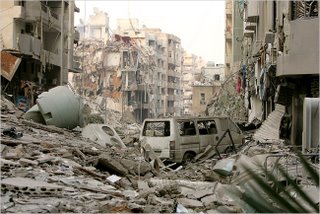A Proportional Response by Israel?

The New York Times has an article about the debate over Israel's response and whether it is proportional or not. The article begins:
The asymmetry in the reported death tolls is marked and growing: some 230 Lebanese dead, most of them civilians, to 25 Israeli dead, 13 of them civilians. In Gaza, one Israel soldier has died from his own armyÃ’s fire, and 103 Palestinians have been killed, 70 percent of them militants. The cold figures, combined with Israeli air attacks on civilian infrastructure like power plants, electricity transformers, airports, bridges, highways and government buildings, have led to accusations by France and the European Union, echoed by some nongovernmental organizations, that Israel is guilty of “disproportionate use of force” in the Gaza Strip and Lebanon and of “collective punishment” of the civilian populations.
Israel's foreign minister has argued that his country's response is in fact proportional because the regional threat posed from terrorists is great. However, this argument seems dubious, as Israel is collectively punishing civilian populations in both Gaza and Lebanon, which are not threatening in any way. In addition, Israel's response has created an estimated 500,000 refugees in the region, which is also substantial. Just because a country is under threat does not give it the right to kill or punish civilian populations, at least if the concept of human rights mean anything.
Click here to read the full article.
--Tom Hayes



3 Comments:
Tom, do you consider sanctions against a country as "collective punishment"? Regards.
Jonathan--I guess it would depend on the type of sanctions, but I would argue that in most cases economic sanctions are in fact collective punishment. From what I have observed, sanctions against foreign governments tend to hurt innocent civilian populations more than the governments that are the intended targets. On the other hand, if sanctions only stop a government from building its military and do not work to hurt the civilian populations, then sanctions are not collectively punishing a population, since people don't need weapons to buy goods for their families. What about you, do you consider sanctions a form of collective punishment?
--Tom Hayes
Thanks Tom. I suppose the problem you run into is where a country is self-sufficient to produce all their own weapons.
Yes, I do believe sanctions are CP. But, as you probably guess from my previous comments, I do believe some collective punishment is necessary.
Post a Comment
<< Home